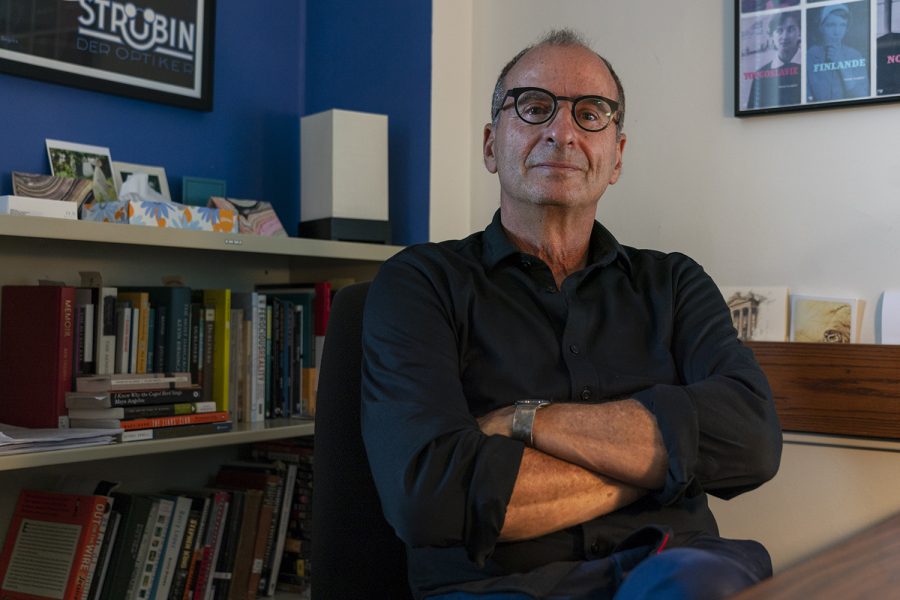Radio days: how acoustic narratives still entangle listeners
Although acoustic narration faded as a form of media in the 40s, it had reignited the interest of viewers. A radio expert and podcasters speak about the current sound phenomenon.
Jeff Porter, University of Iowa professor of sound poses for a portrait on Wednesday Sept. 18, 2019. (Mason Childs/The Daily Iowan)
September 19, 2019
“I wonder if future generations will ever hear about us. It’s not likely,” predicted voice actor Wallace Shawn’s character in the 1987 film Radio Days as the cultural revolution that was radio in the 1940s came to an end. However, while radio has faded, sound as a storytelling medium remains alive and well today.
With popular podcasts like Homecoming and Welcome to Nightvale, acoustic narration has re-emerged as a form of storytelling the general public has reverted to, sometimes leaning to stories told through sound over those with visuals. Once the topic of discussion with War of the Worlds and Sorry, Wrong Number in the 1940s, acoustic narration has returned as a storytelling medium through the medium of podcasts. According to University of Iowa English professor Jeff Porter, it’s not startling news.
“Podcasts have been in vogue for the last five years and show little sign of losing charm,” said Porter, who wrote Lost Sounds: The Forgotten Art of Radio Storytelling.
“Believe it or not, old-time radio was pretty wild. CBS ran an experimental program (The Colombia Workshop) that aired avant-garde radio plays and narratives, like The Fall of the City by Archibald MacLeish,” said Porter.
Acoustic narration has even taken motion here in Iowa City in the form of the student-written and produced podcast, Andromeda. Run by UI students, Andromeda is a science fiction podcast about two criminals caught in an intergalactic fiasco. Kylie Moss, the co-writer and creator of Andromeda along with Rebecca Carey, said she found sound to be a much more exciting and tangible venture for telling her stories.
“Podcasting engages the imagination in a way that naturally meshes well with rich, over-the-top genres like sci-fi. Without the budget for a film and the network for a novel, podcasting provided the perfect creative space,” Moss said.
The lack of visuals in acoustic narration is a blessing for Moss and the Andromeda team.
“Podcasting as a medium eliminates visuals, which suited Andromeda as it took away the burden of somehow representing space and futuristic civilization,” Moss said.
Where acoustic narration differs from prose or audiobooks is its ability to become a platform for actors. It becomes somewhat of an obstacle and adventure for performers, according to Andromeda voice actress Syndey Ginter.
“The biggest difficulty is trying to convey emotion and feeling without the good ol’ crutch of body language,” Ginter said. “Voice acting is a completely unique experience that forces me to use all the skills I have from years of theater.”
Andromeda is one of many rebirths of audio narration throughout the years. According to Porter, acoustic narration may keep returning because of the way it gets inside the head of the listener.
“Maybe we’re more like whales and dolphins,” Porter said. “Radio voices get inside our head the way cinema and TV can’t, no matter how provocative. There really isn’t an equivalent to the acoustic world. Most forms of listening draw us closer to the source. Sound is intimate.”



